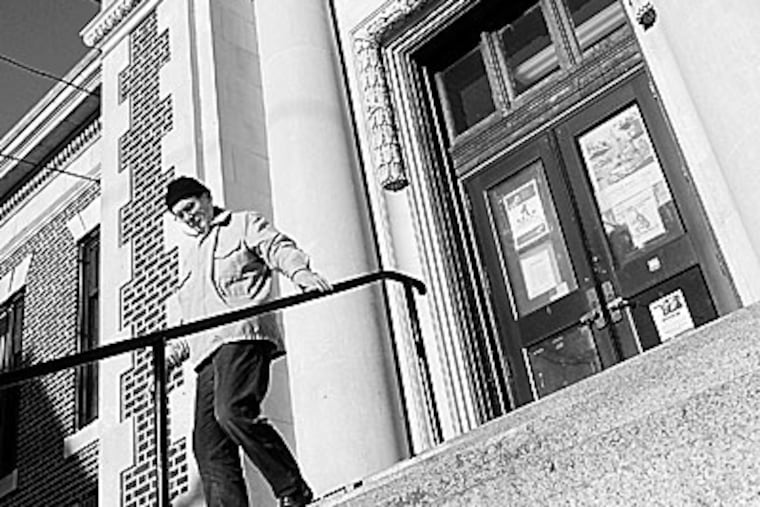Alternatives to closings
Amy Dougherty is executive director of the Friends of the Free Library of Philadelphia: The Friends of the Free Library understands Philadelphia's economic reality and why Mayor Nutter would propose closing 11 neighborhood branch libraries.

The Friends of the Free Library understands Philadelphia's economic reality and why Mayor Nutter would propose closing 11 neighborhood branch libraries.
However, we believe that no public libraries in the city should close until we have a reasonable period of time to propose practical, fiscally sound alternatives to preserve service for library patrons. Rather than permanent closures that hurt neighborhoods and citizens, we should come together and temporarily shoulder shared sacrifice to achieve the necessary savings.
We are calling for a moratorium on library closures combined with temporary, across-the-board service reductions spread across all branches through this fiscal year, which ends June 30. We will take this six-month period to work with the Nutter administration and the Free Library leadership to develop a permanent solution that preserves essential services, keeps libraries open, and does not target specific communities.
In these tough economic times, we need the resources and opportunities provided by our libraries.
Philadelphia has a 45-percent school dropout rate and a poverty rate of 25 percent and rising, the highest of any large U.S. city. The Free Library can be an essential tool in reversing these demographic trends, through after-school programs, job-search assistance, resume workshops, literacy-training classes, and free Internet access. The Free Library offers Philadelphians both a ladder to opportunity and a supporting hand as they climb it.
Before we close a single neighborhood library, we have a duty to thoughtfully consider all possible alternatives in an open and transparent process that involves the communities affected.
We plan to convene a working group, including library users and administrators, and representatives of the city government and school district, to study creative staffing and service-providing models. We want to look at the possibility of partnerships that will help maintain essential services at less expense to the city. We have already heard from universities, nonprofit groups and volunteers about their willingness to help, and we have urged City Council to hold hearings on alternatives to branch closures.
No doubt, in those hearings, defenders of the cuts would say that Philadelphia has the most libraries per capita of the 10 largest U.S. cities, suggesting that our system is too large and needs to be "right-sized." This pat formulation misses the mark. It appears designed to support a predetermined conclusion, rather than reach a well-reasoned decision.
Most important, this talking point ignores that in six of the nine cities to which the Nutter administration is comparing Philadelphia - Los Angeles; Houston; San Antonio, Texas; San Diego; Dallas; and San Jose, Calif. - all public schools have libraries staffed by trained professionals. In a seventh city, Chicago, 550 out of the 600 public schools have school-based libraries staffed by certified teachers with library training.
In Philadelphia, by contrast, about half of our public schools have no libraries, a fact that library leadership said it was unaware of when we met with them and the mayor Nov. 21. The majority of the schools near the 11 libraries targeted for closure lack libraries. So it's not unusual to see students and their teachers using Free Library branches during school hours.
Students from the Stephen A. Douglas High School are sent by their teachers to the Fishtown library to work on research projects and receive reference assistance.
The Harambee Institute of Science and Technology charter school depends on the Haddington library during school hours for basic instruction in library use, story time, and independent reading.
Logan Hope School students, many of whom are of Cambodian descent, routinely go to Logan library to complete their assignments and for research.
And teachers at the Montessori-Genesis II School take their classes on weekly visits to the Durham branch to check out books and use computers.
Another problem with the "right-sizing" argument is that it fails to consider differences in the roles libraries play and the populations they serve in various cities. Of the 10 cities, Philadelphia ranks lowest in education level and highest in poverty and crime.
Shrinking the system suggests that we should engage in a race to the bottom, reducing the number of libraries in Philadelphia just to fall in line with other cities. We suggest just the opposite. We should be proud of our nation-leading library density. We should tout our system and use it to help attract and retain citizens who place a premium on knowledge-based infrastructure. We should preserve our fantastic Free Library system, not starve it.
Mayor Nutter, we want to do our part during this fiscal crisis. Give us the time to help the city and preserve our library system.